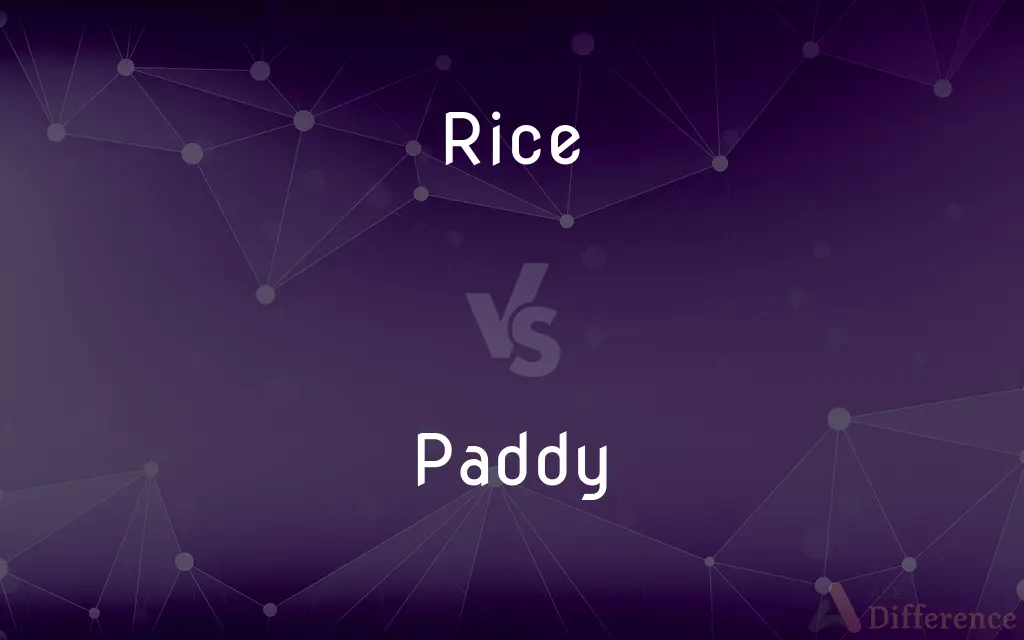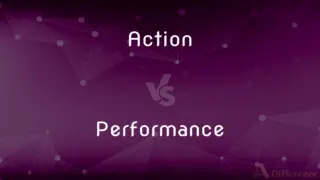Rice vs. Paddy — What's the Difference?
Edited by Tayyaba Rehman — By Fiza Rafique — Updated on October 27, 2023
Rice is a edible grain obtained from a cereal plant. Paddy is field where rice is grown, usually flooded.

Difference Between Rice and Paddy
Table of Contents
ADVERTISEMENT
Key Differences
Rice is the grain harvested from the rice plant, used as food worldwide. Paddy refers to the field where this rice plant is cultivated, often involving water-flooded fields.
While Rice undergoes processing like milling to become edible, Paddy is the natural habitat where the rice plant grows, involving agricultural practices.
In cuisine, Rice is a staple food in many cultures, versatile in recipes. In contrast, Paddy is an agricultural term, not directly related to cooking.
The cultivation in a Paddy is essential for the growth of rice plants, with unique irrigation methods. Rice, after harvest, is separated from the husk and often polished.
Rice can be of various types like basmati or jasmine. Paddy fields vary based on geographic location and water management practices.
ADVERTISEMENT
Comparison Chart
Definition
Edible grain
Field for cultivation
State
Processed for consumption
Natural growing condition
Relation to Food
Directly consumed
Source of rice
Cultivation
Not applicable
Involves unique irrigation
Varieties
Different types based on grain
Different based on farming methods
Compare with Definitions
Rice
The rice harvest was abundant this year.
Paddy
The paddy was ready for harvesting.
Rice
He used rice in his casserole.
Paddy
They owned a large paddy in the valley.
Rice
Rice is a staple in Asian cuisine.
Paddy
The paddy requires careful water management.
Rice
Rice is the seed of the grass species Oryza sativa (Asian rice) or less commonly Oryza glaberrima (African rice). The name wild rice is usually used for species of the genera Zizania and Porteresia, both wild and domesticated, although the term may also be used for primitive or uncultivated varieties of Oryza.
Paddy
Water filled the paddy for irrigation.
Rice
A cereal grass (Oryza sativa) that is cultivated extensively in warm climates for its edible gn.
Paddy
Birds flocked to the green paddy.
Rice
The starchy gn of this plant, used as a staple food throughout the world.
Paddy
Used as a disparaging term for a person, especially a man, of Irish birth or ancestry.
Rice
To sieve (food) to the consistency of rice.
Paddy
Rice, especially in the husk, whether gathered or still in the field.
Rice
(uncountable) Cereal plants, Oryza sativa of the grass family whose seeds are used as food.
Paddy
A specially irrigated or flooded field where rice is grown.
Rice
(countable) A specific variety of this plant.
Paddy
Or unhusked rice, either before it is milled or as a crop to be harvested.
Rice
(uncountable) The seeds of this plant used as food.
Paddy
(countable) A paddy field, a rice paddy; an irrigated or flooded field where rice is grown.
Rice
The types of automobile modifications characteristic of a rice burner.
Paddy
A fit of temper; a tantrum.
Throw a paddy'' etc.
Rice
A twig or stick.
Paddy
A white person.
Rice
A bobbin or spool.
Paddy
A labourer's assistant or workmate.
Rice
(transitive) To squeeze through a ricer; to mash or make into rice-sized pieces (especially potatoes).
Paddy
A drill used in boring wells, with cutters that expand on pressure.
Rice
(intransitive) To harvest wild rice (Zizania sp.)
Paddy
(obsolete) Low; mean; boorish; vagabond.
Rice
(rare) To throw rice at a person (usually at a wedding).
Paddy
Low; mean; boorish; vagabond.
Rice
To customize the user interface of a computer system, e.g. a desktop environment.
Paddy
A jocose or contemptuous name for an Irishman; - usually considered offensive.
Rice
A well-known cereal grass (Oryza sativa) and its seed. This plant is extensively cultivated in warm climates, and the grain forms a large portion of the food of the inhabitants. In America it grows chiefly on low, moist land, which can be overflowed.
Paddy
Unhusked rice; - commonly so called in the East Indies.
Rice
Grains used as food either unpolished or more often polished
Paddy
(slur) a person of Irish descent
Rice
Annual or perennial rhizomatous marsh grasses; seed used for food; straw used for paper
Paddy
An irrigated or flooded field where rice is grown
Rice
English lyricist who frequently worked with Andrew Lloyd Webber (born in 1944)
Paddy
Rice in the husk either gathered or still in the field
Rice
United States playwright (1892-1967)
Rice
Sieve so that it becomes the consistency of rice;
Rice the potatoes
Rice
She cooked basmati rice for dinner.
Rice
The white rice was served with curry.
Common Curiosities
Is rice healthy?
It can be, especially whole grain varieties.
What is rice?
Rice is an edible grain harvested from a cereal plant.
Are there different types of rice?
Yes, including basmati, jasmine, and brown rice.
Can rice be grown without a paddy?
Yes, but paddies are common for certain varieties.
How is rice processed?
Often by milling and sometimes polishing.
What is a paddy?
A paddy is a field where rice is grown, usually flooded.
What's unique about paddy fields?
They're often flooded for rice cultivation.
Can rice be colored?
Yes, there are red, black, and brown varieties.
Are paddies found worldwide?
Predominantly in Asia, but also in other regions.
How long does a paddy take to mature?
About 3-6 months, depending on the variety.
Is paddy used for other crops?
Rarely, it's mainly for rice.
Do all rice varieties need flooding?
No, some can grow in drier conditions.
Can rice be used in desserts?
Yes, in dishes like rice pudding.
Is white rice natural?
It's processed, with the husk and bran removed.
Why are paddies flooded?
To control weeds and pests.
Share Your Discovery

Previous Comparison
Intramural vs. Extramural
Next Comparison
Action vs. PerformanceAuthor Spotlight
Written by
Fiza RafiqueFiza Rafique is a skilled content writer at AskDifference.com, where she meticulously refines and enhances written pieces. Drawing from her vast editorial expertise, Fiza ensures clarity, accuracy, and precision in every article. Passionate about language, she continually seeks to elevate the quality of content for readers worldwide.
Edited by
Tayyaba RehmanTayyaba Rehman is a distinguished writer, currently serving as a primary contributor to askdifference.com. As a researcher in semantics and etymology, Tayyaba's passion for the complexity of languages and their distinctions has found a perfect home on the platform. Tayyaba delves into the intricacies of language, distinguishing between commonly confused words and phrases, thereby providing clarity for readers worldwide.
















































